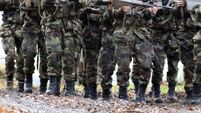Ireland 'increasingly' a target for espionage by hostile states, security report finds

The Defence Policy Review said Ireland is 'more vulnerable' to cyber and hybrid threats. Picture: File
Ireland’s position as a “global” tech centre and a geographic hub for data centres and internet cables is “increasingly” making it a target for espionage from hostile states, according to a Government security report.
The Defence Policy Review 2024 said Ireland is “more vulnerable” to cyber and hybrid threats, including to the country's critical infrastructure and democratic institutions.













